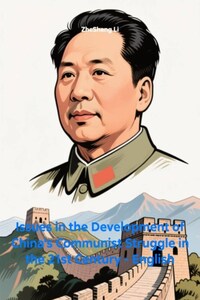This book aims to explore the future direction and development path of international communism, Marxism, and scientific socialism in the rapidly changing 21st century. In the 21st century, facing unprecedented challenges and opportunities brought by globalization, as well as the rich experiences and profound lessons accumulated in historical practice, we need to re-examine and explore the contemporary value and practical pathways of Marxist theory. Formulating 21st-century Marxist-Leninist and socialist theories that align with current developmental goals has become a significant historical task borne by our generation.
Marxism, as a scientific theoretical system founded by Marx and Engels, encompasses a scientific worldview, theories of social and historical development, the theory of proletarian revolution, and the theories of socialist and communist construction. It emerged in the 1840s as a product of intensifying capitalist contradictions and the development of the workers' movement. In the late 19th and early 20th centuries, Lenin creatively developed Marxism. Faith in Marxism and belief in socialism and communism have always been the foundation and political soul of Communists' existence and purpose. In China, this ideal and conviction is vividly likened to the "calcium" in the spiritual life of Communists—if theory and ideals are lacking or wavering, Communists will suffer from a spiritual "calcium deficiency," leading to ideological "soft-bone disease." Therefore, upholding and developing Marxism is the foremost issue determining the success or failure of the cause.
To this day, the universal truths of Marxism possess enduring intellectual value. However, the classical Marxist writers did not exhaust all truth but continuously paved the way for seeking and developing it. Socialism has always advanced through exploration. Therefore, the core issues this book focuses on are precisely aimed at addressing the widespread concerns of the contemporary international community regarding the future and destiny of socialism and communism. These issues not only touch upon the foundations of theoretical and path confidence but also relate to the development path chosen by China, a nation of over 1.4 billion people, as well as the lofty goals of human society in pursuing prosperity, democracy, civility, and harmony.
Under the new historical conditions of the 21st century, the Communist Party of China, as the ruling party in China, bears the responsibility of uniting and leading the people to comprehensively build a socialist society, advance socialist modernization, and realize the great rejuvenation of the Chinese nation. The developments in the international situation since the 21st century, the expansion of undertakings, and the expectations of the people all demand that the Communist Party of China, with a spirit of reform and innovation, comprehensively advance the new great project of Party construction. The success of the cause of socialism with Chinese characteristics, along with the continuous development of its theory and practice in the 21st century, is not only crucial for the Chinese people's aspiration for a better life but also has a profound impact on world peace and development.
Below, we will elaborate in detail on the significance and importance of the core issues to be explored in this book:
The first topic explores "whether China today represents revisionism," with its significance lying in directly addressing the essence and directional nature of socialism with Chinese characteristics, while also responding to domestic and international doubts about China's economic system reforms.










